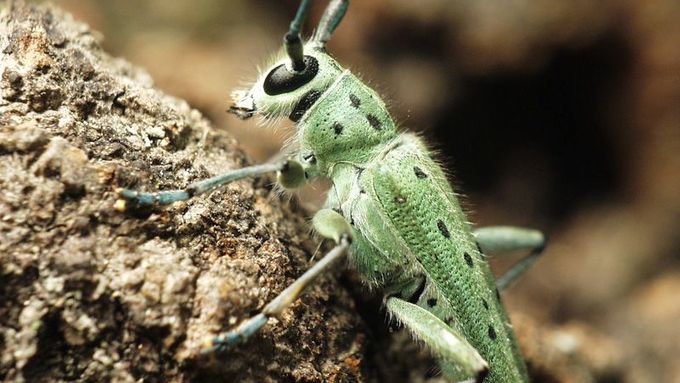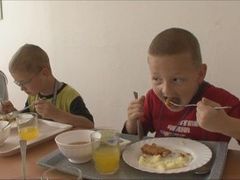Infobox
Edible insects:
- Marie Borkovcová does not recommend to pick insects in the wild.
They can be bought at pet shops. Feed them with diversified food for several days (use fresh kitchen leftovers). Then let them starve for two or three days. - Kill the insects by throwing them into boiling water.
Insects commonly eaten around the world:
- beetles, ants, bees, wasps, locusts, cockroaches, crickets, capsids, cicadas, leafhoppers, dragonflies, mayflies, caddisflies, scorpion flies, flies, mosquitos, lice
Risks:
- Too much of everything is as bad as too little - a handful of insects a week is enough
- Do not pick them in the wild - be aware of poisons and pesticides
- People allergic to seafood might be also allergic to insects
Brno - Czech health specialists are starting to get seriously interested in using insects in nutrition. Marie Borkovcová from Mendel University of Agriculture and Forestry in Brno confirmed this to Aktuálně.cz. Borkovcová presented her research on May 6 at a public lecture.
This Brno university is the only one in Europe that focuses on research in entomophagy, which is the practice of using insects as a part of a daily diet. There is only one more site of such kind in Mexico.
Marie Borkovcová is leading the research which can help people solve two biggest nutritional problems of today - malnutrition and obesity. While in developing countries insects could help prevent food crises, in developed countries they can help the elderly, for example.
Diversified food for the elderly
"Older people don't often manage to consume sufficient amounts of diversified food. Their food intake is not always sufficient. And insects can fix this. There is a greater amount of nutrients in a smaller amount of food," claims Borkovcová.
Due to the high content of mineral substances, trace elements, omega fatty acids and essential fatty acids, insects are said to be a unique supplement to the diet of elderly and sick people.
Marie Borkovcová together with her daughter is now analysing those species of insects that are commonly kept in the Czech Republic. They try to determine the specific amount of nutrients that insects containg during different stages of development.
In the future, we might be able to use food supplements made of insects, in the same way that elderly and sick people use the so-called nutridrinks these days.
"Older people would hardly buy and keep grasshoppers. It is more likely that doctors would prescribe ready chemical that would be available at pharmacies," describes the possible future Borkovcová.
Insects can also replace the food supplements for other generations. However, people's loathing of beetles, worms or grasshoppers can be an impediment.
This fact is also confirmed by the head of Department of Human Nutrition at the Faculty of Medicine at Masaryk University in Brno, Zuzana Brázdová.
"In its evolution, homo sapiens has been accompanied by an attitude towards new food, which is called food neophobia. Simply said, I don´t eat what I don´t know," says Brázdová.
"Hence, I see the consumption of insects in Central European countries as quite problematic. There is still a long way for insects to go to get to our plates, and I think, it will take generations," adds Brázdová.
Insects for the undernourished
Borkovcová also suggests diet specialists to use insects after destructive disasters. Helicopters carrying humanitarian aid wouldn´t have to load such heavy cargo of food while delivering the same nutritional value.
Similarly, undernourished people in the developing world wouldn´t have to depend on the deliveries by humanitarian or governmental organizations, but could collect and harvest insects themselves at minimum cost. "A solution will need to found to solve the world food crisis," agrees Brázdová.
"However, when I had the chance to personally deal with the malnutrition of children while working for the World Health Organization, we always had to follow the rule about not using food that is considered as cultural taboos in the specific area," adds the nutrition expert.
Soon in restaurants as well
If the Czech army or gerontologists started using insects, the Czechs would be first in the world to do so. Conversely, the Czechs are behind when it comes to serving insects in restaurants. However, that is expected to change soon.
"This is a breakout year. There is a huge interest in entomophagy. We started to hear from possible clients from the commercial sector," stated Borkovcová.
She is in contact with representatives of some local restaurants, but also with people who want to breed insects for kitchens. So far, beetle and mealworm lovers have had to buy them at pet shops and reproduce the vermin at home.
Brno-based company Brixton catering, which runs restaurants such as Boulevard and Noem Arch restaurants, is considering occasionally serving delicacies with beetles, grasshoppers or worms.
"The biggest problem is to find common ground with the hygienists. A living beetle has no place in the kitchen, according to the current rules. That´s why we are trying to find a way to follow the rules and also offer some good quality fresh insects to our customers," described the situation Martin Kobylka, a Brixton representative.
Your next opportunity to try meals made of insects will be in Brno during the Ecological Fair on May 21 and 22. The organizing EnwiWeb company considers the insect meals to be the most ecological food.

